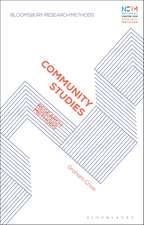Focus Group Methodology: Principle and Practice
Autor Pranee Liamputtongen Limba Engleză Paperback – 30 mar 2011
Like her previous book, Researching the Vulnerable, Liamputtong's latest work pays close attention to research ethics and will also be of great interest to researchers who are working with different social groups - such as women, men, older people, children and ethnic groups - and anybody who is engaging in cross-cultural research.
Illustrated with case studies and examples throughout, this is a perfect introduction to focus group methods for students and new researchers alike.
Preț: 392.57 lei
Nou
75.14€ • 81.65$ • 63.16£
Carte disponibilă
Livrare economică 31 martie-14 aprilie
Livrare express 15-21 martie pentru 32.20 lei
Specificații
ISBN-10: 1847879098
Pagini: 224
Dimensiuni: 170 x 242 x 13 mm
Greutate: 0.39 kg
Ediția:New.
Editura: SAGE Publications
Colecția Sage Publications Ltd
Locul publicării:London, United Kingdom
Recenzii
'This lucidly written book will appeal to readers ranging from undergraduate students to seasoned academics in the field of social science research. Liamputtong has succinctly provided valuable insights into conducting focus group discussions, not merely as a means of quick data collection but rather as an instrument that can create knowledge for social transformation. In essence, focus group discussions bear consonance with the subtle aims of social science to generate collective consciousness and deepen the understanding of structural contexts of oppression and social change'
Cuprins
Focus Group Methodology: Theories and Ethics
Focus Group Methodology and Principles
Focus Group Methodology and Practical Considerations
Conducting Focus Groups and Practicalities
The Use of Focus Group Methodology in the Health and Social Sciences
Focus Group Methodology and Sensitive Topics and Vulnerable Groups
Focus Group Methodology in Cross-Cultural Research
Virtual Focus Groups
Managing and Making Sense of Focus Group Data
In Conclusion
Notă biografică
Pranee is a medical anthropologist and has interests in the health of women, children, immigrants, refugees, older people, and transgender individuals. In terms of health issues, Pranee is very interested in issues relating to motherhood, reproductive health, sexuality, sexual health, mental health and chronic illnesses. Recently, Pranee has focused her research on sexuality and sexual health issues of Asian women, refugee/immigrant women, young people, and trans women of colour. She has written a number of textbooks and research articles on health-related issues. Pranee is also a qualitative researcher and has written many textbooks on this approach. Some of her textbooks (Qualitative Research Methods, Research Methods in Health and Evidence-Based Practice, Social Determinants of Health, & Public Health) have been adopted widely, both in Australia and overseas. Previously, Pranee held the position of Professor of Public Health at Western Sydney University and Personal Chair of Public Health at La Trobe University, in Australia. She is now a Professor of Behaviour Sciences at the College of Health Sciences, VinUnivesity in Hanoi where she continues her research with marginalised groups in Vietnam and other groups in Asia.




























